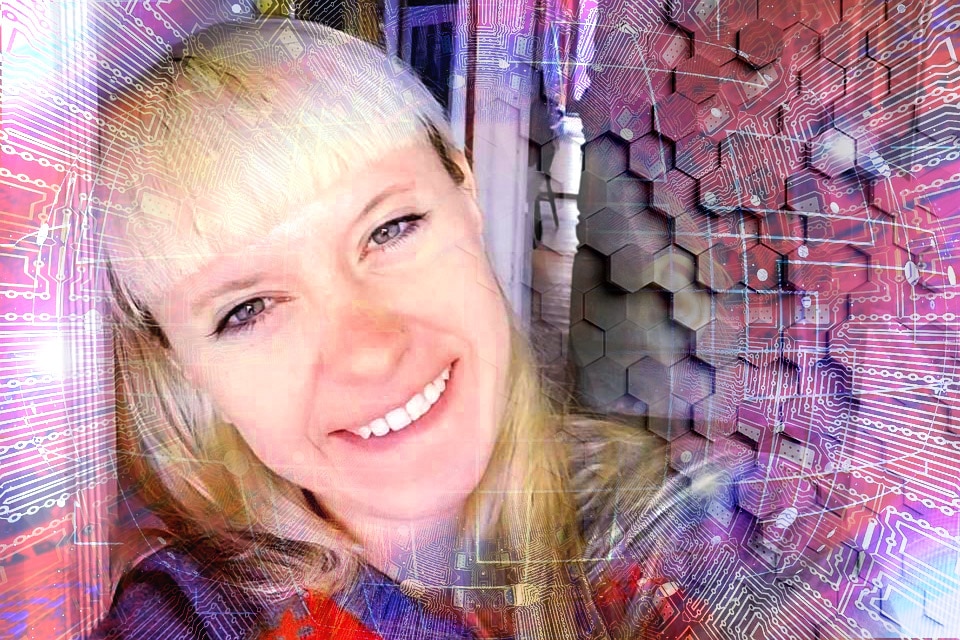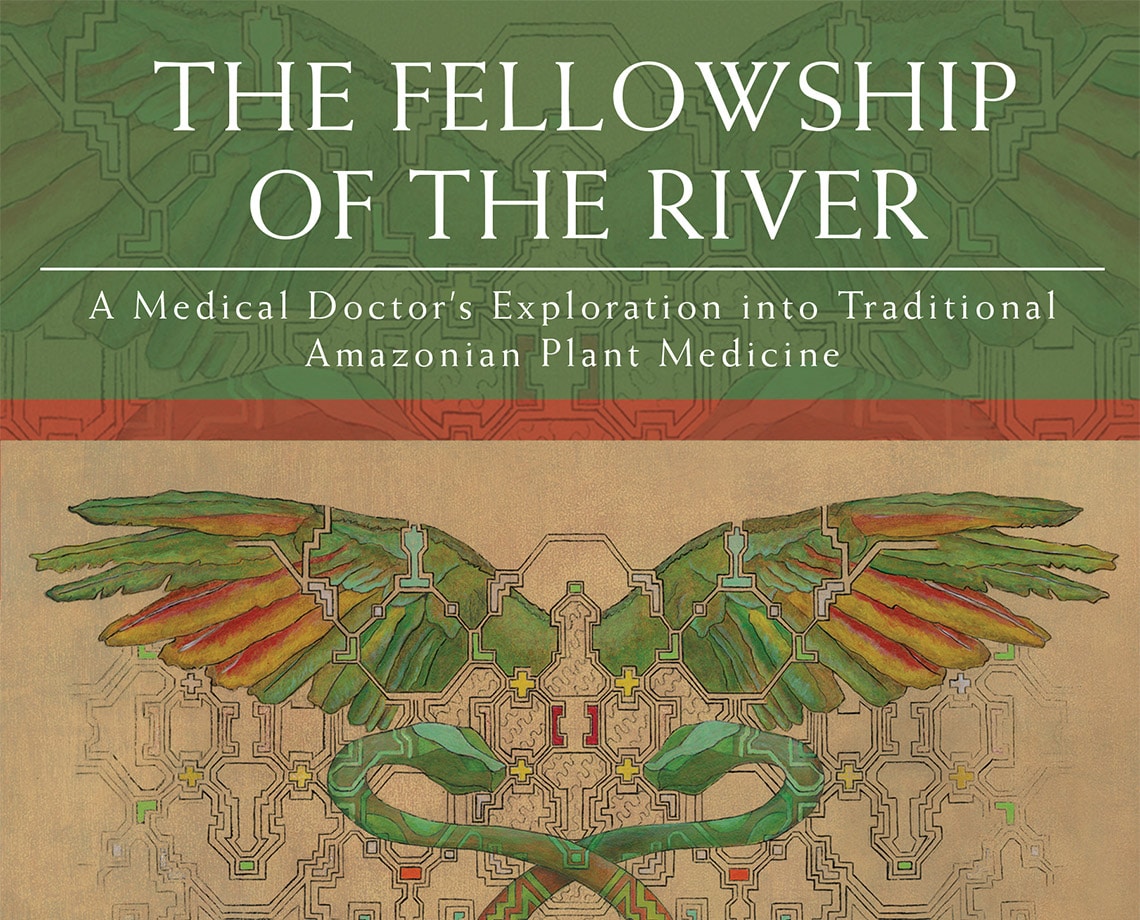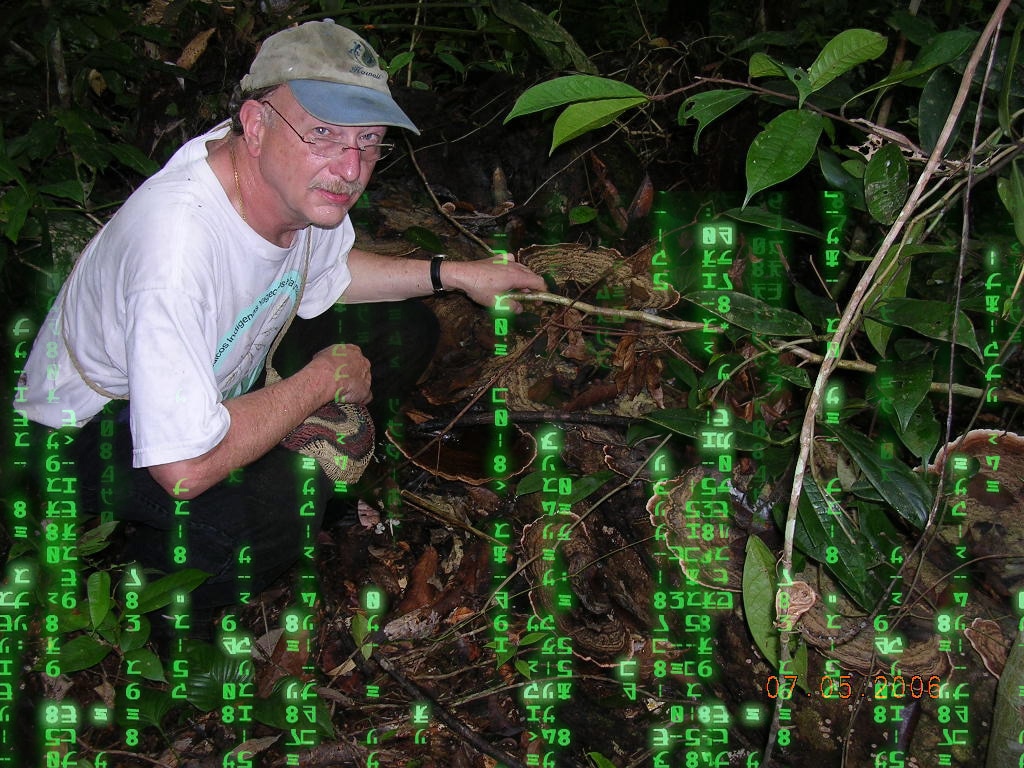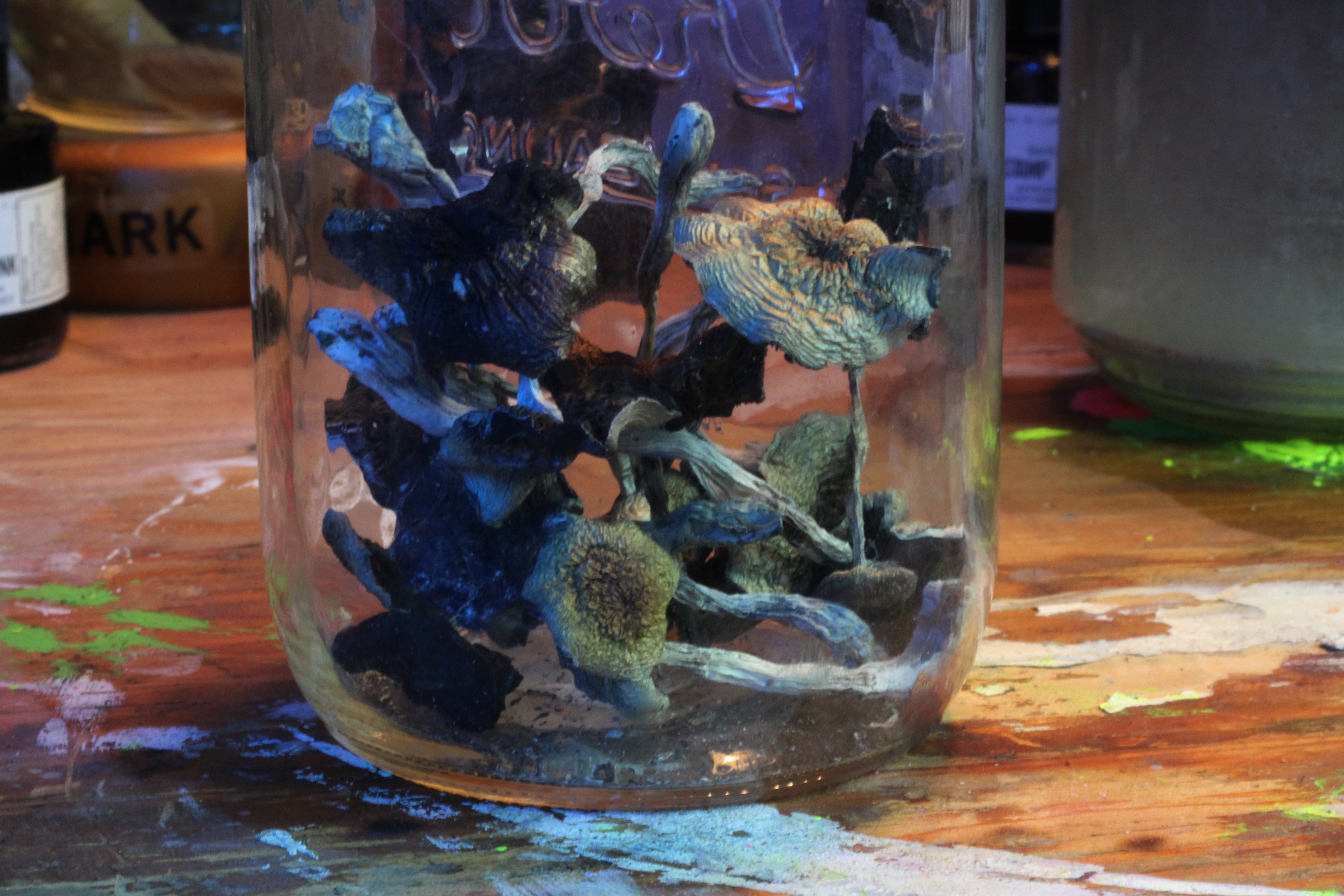In this far-ranging interview, I speak with Emma Stamm, a freelance journalist and Ph.D. candidate who is writing her dissertation on psychedelics, machine learning, and artificial intelligence (AI). In this conversation, we explore the diverse realms of cutting edge technology, Western materialism, Eastern spirituality, and radical ideology.
Thanks so much for speaking with us, Emma. I’m excited to dive into some juicy subjects with you: psychedelics, technology, and politics. To start off, can you share a little bit of your academic background?
As an undergrad I studied philosophy and literature and developed a love for theory of philosophy. Around that time in my earlier 20’s, I also became very interested in technology but I didn’t want to study it by taking computer science classes. I taught myself how to build websites and program in a few different coding languages, and over the years I began to combine my loves of philosophy and technology by looking at code and all sorts of technical things from a philosophical perspective.
I started my Ph.D. two years ago and today I am in an interdisciplinary program at Virginia Tech. I work mostly with philosophy and political theory, but also with the university’s Department of Science and Technology Studies, so I blend all of them. As I was developing my doctoral dissertation, I knew I wanted to do something with the philosophy of machine learning and artificial intelligence. Around the same time, just out of personal interest and not as an academic, I started looking into the research with psychedelics. I started to see a lot of overlaps between psychedelic research methods and some of the issues that had been coming up in machine learning and artificial intelligence, so I decided to run with those overlaps.
Machine learning and AI and the relationship with psychedelic science— can you dive into that more?
In my research, I talk about the ways in which data science is changing how we think about knowledge. So for example, before the rise of big data, the scientific method since its development by Karl Popper would be that you came up with an idea, a hypothesis like “gravity is what causes apples to fall from trees” and then go out and test it over and over again to get scientific proof. With the rise of big data, there’s this idea that instead of coming up with ideas beforehand, we can gather tons and tons of information on something, and submit all of that data to computer systems and analyze it with precise computational techniques so we don’t need to build theories anymore— we can just apply a lot of computer science and math.
This idea— the idea that knowledge can be produced computationally rather than by human hypotheses— has been troubling a lot of philosophers of knowledge and people who study epistemology. We think we can produce new knowledge via advanced computational systems just by giving an AI a lot of data rather than inserting the human element. So I looked at the way that people make theories and develop frameworks for interpreting psychedelic drug trials. I’m trying to argue that the way we’re going to come to a full scientific understanding of how these drugs work relies on a human element that’s very subjective and creative in its ways of interpreting trip reports and things like that. And that challenges some of these assumptions about AI.
Fascinating. Let’s talk about the importance of the subjective experience, the unquantifiable aspect. In your Ordinary Doses article, which I loved, you point out that there’s some tension between this technological, materialist understanding of how psychedelics work, and the more mystical and subjective understandings of the psychedelic experience. It could be said that the more we rationally reduce these experiences to what’s happening in the brain physiologically, the harder it could be to have a mystical experience. But my thought was, perhaps it’s not an “either/or” but a “yes/and.” As we gain better understanding of what’s happening scientifically, this can actually serve to reinforce and legitimize the subjective experience by showing the material correlations. I’m curious what your thoughts are on that tension: does one detract from the other, or do you see them as coexisting and even being mutually reinforcing?
One of my favorite things about studying psychedelics from this philosophy of science and technology perspective is that it really calls forth the tensions between materialism and spirituality or transcendence. For me, it definitely mutually reinforces those two principles. I consider myself a very spiritual person, but I also love science. I also am very interested in how the definition of science changes over time.
It is important to note that the scientific method as we know it is not a very old idea. So this notion of what counts as ‘real hard science’ and what we consider to be properly transcendent in contradistinction to the material world is very much still open to interpretation. For there to be a tension between those two things, one would have to have a very fundamental view of either— like if I were a Christian who believed that spiritual transcendence looked like one specific thing, the fact that it could be achieved with a synthetic molecule might offend me.
There are so many different ways to look at science and spirituality. I’m not alone— in the psychedelic community, especially— in seeing how something man can understand and have power over, like science, is also perhaps the result of a higher dimension. That actually works very well if you don’t think about those things exclusively, but for some people it does continue to be problematic. My personal spiritually leans in the Eastern direction, probably like a lot of other people interested in psychedelics.
I love that perspective and agree that we need to find ways for those two sides to talk to each other. And even on a higher level (straying into the woowoo here), it seems to be part of the grander purpose and necessary destination of humanity: learning how to unite the masculine energies and the feminine energies, order and chaos, rationality and mystery… your perspective seems to be a microcosm of these ideas. The more unity we can bring forth, the more integrated and well-functioning we’ll become as a society.
One thing I think about a lot is the common association between rational, goal-oriented behavior and linear thinking, and how the psychedelic experience is something that breaks that— it undermines these patterns of thought and emotion, and heals us psychologically because it introduces a beautiful chaos or a beautiful unknowability.
I really do believe that at this moment in society, people really need spaces in which they can be irrational or come into direct contact with experiences that would break these habitual patterns. It’s very interesting that we could have a science of mystery, a discipline based on the idea that science can be used to introduce the antithesis of science— and again, that’s all based on common notions of what it means to be “scientific” and what it means to be “spiritual.” You could think of it as the yin and the yang, where the yang is this scientific, rational side and the yin is this more chaotic, unknowable mystery that people really need.
I love talking about this stuff and I think there’s a real place for it. In the common discourse of science, you can’t really say things like that— like when you said it’s a little bit “woowoo.” Yet I think it is essential to use language that is not used in scientific communities in order to understand what’s really happening.
Yes, which is why we all need to sort of become linguistic masters, to contextualize and shape these ideas in palatable ways that honor both the yin of spirit and the yang of rationality. And it’s funny because science itself, even in its purely materialistic pursuits, is butting up against the mystery in a very big way in dealing with the hard problem of consciousness, the frontiers of quantum physics, and so on.
Yes, and I find that very inspiring. There’s a tendency, especially in academia and even if you are in the humanities, to try to always have answers for things. People don’t like to admit that they may be working in areas that are mysterious to the core, that they’re going to run up against limits.
I’ve found the philosophical study of knowledge to be a good home for me because epistemology is a vehicle by which you can really engage in questions like “How much of reality is really knowable anyways?” and “Does it even matter if we are dealing with things that we can’t fully apprehend with our minds?” We’re working at the horizons of knowledge. To have these kinds of conversations, I have to find a certain kind of colleague in my world. If I were not in higher education, I could say these things more freely and feel a bit more understood.
I think we need people exactly like you who are doing the bridge-building of wearing both hats at the same time. I think this is so important.
Something that you hear a lot in the psychedelic community is that psychedelics are “the medicine that the world needs.” In the West, and particularly the United States, we have a very Cartesian society that is focused on science and materialism, and we have seen the ill effects of that in our destruction of the environment, losing touch with community, the absence of personal meaning, and so on. Psychedelics seem to be that introduction of chaos, the feminine mystery that our society has lost— the visceral, subjective experience of being alive and connected to nature and all of life. It’s a rebalancing that is direly needed.
One thing that I think about a lot is what the effects of the psychedelic experience are, not just on individuals but on society. I definitely think that when done intentionally, for the most part, psychedelics have a positive effect on individuals and perhaps on small groups. We haven’t really seen, at least not in the West during our time period, what might happen if people en masse gained the insights that people tend to gain from LSD, psilocybin and whatnot. If every person were to have had one or two major LSD experiences, would that lead us, as a society, in a completely different direction?
I’ve heard a few talks given on these ideas, and some people say we can’t necessarily expect the psychedelic experience to translate into one kind of political view or one kind of social system. People could do LSD and still become fascists, and doing it doesn’t necessarily make you an environmentalist or whatnot. Yet I suspect, at the very least, that if this were to hypothetically happen, people would act a little more selflessly and scale back a bit of the neurotic, hyperlinear materialism. But we can’t really know.
Yeah, and I wanted to get into this. As you mentioned, some people think that if psilocybin, for example, is being served up by a venture capital-backed, for-profit corporation, that the subversive potential in the psychedelic experience will be defanged, that it will lose its ability to impact higher political and social order. I think I see eye-to-eye with you on this, in that I feel there is something inherent in the psychedelic experience itself that will be generally beneficial and rebalancing, no matter what.
Obviously there will be outliers, but if we look at the generalized effects of psychedelic experiences they are reconnection to nature, healing of trauma, discovery of the true self, novel thinking, breaking down of old patterns, and so on. I can’t help but conclude that psychedelic experiences en masse will fertilize the soil, so to speak, of the collective psyche, by changing individuals. Each individual is going to be less likely to respond to fear-based tactics and will feel more connected to nature and community. Of course these are all generalizations resulting from the effects of mindful use, but overall that’s what is going to happen. I think that people who are more integrated and less traumatized are going to put up with less bullshit, basically, and tend to want to change the existing order to better reflect what they see as the natural truth of their being and their relationship to others and the world.
Yeah, I’m completely with you on that. I think there is something inherent to the psychedelic experience that won’t be distorted by the means of access. So if you are getting your psilocybin from a bona fide anti-establishment shaman, or through a company sponsored by Peter Thiel, that psilocybin is probably not going to have a radically different effect based on those two means of access.
This really reveals that there is a certain ideology that people are coming to this with. I have my own political beliefs— like I would identify as anti-capitalist— but at the same time, I don’t hate people like Peter Thiel. I don’t have a strong negative reaction to the system that we’re in, on spiritual principle. I don’t think that there is so much evil in the system or the people in it that they can’t be worked with to some extent. I think that negativity and reactiveness don’t really work over time, and it reflects people’s ego attachment to their politics. What may come about through psychedelics is so powerful that we should embrace any reasonable way that we could get to them— we just have to be careful about how it may look.
I’m always put into a bit of an awkward position because I will stand against capitalism in the things I write and teach, while also saying that it’s ok for us to work within the system to create certain experiences for people. To a lot of my audiences, whether it’s my students or colleagues or whatnot, this may seem like I’m being a hypocrite. It’s not always easy to explain how I’m trying to reconcile those poles, but some people get it on an intuitive level. Maybe the fact that I have spent a lot of time meditating on this line of thought has helped me to hold this view without a lot of inner conflict.
Whatever winds up happening in the broader political sphere— we’re obviously in these difficult times right now— I don’t think anything good will come of people negatively reacting or pushing back against one point or another without really trying to rise above a little bit. Then again, that’s really hard to do when society is so pluralistic and we all come from different perspectives. Not everyone is psychedelic, not everyone is spiritual. It’s a whole mess.
I really do believe that is the perspective that we need, a pragmatic one. I think we need to have constructive dialogue and not be so ideologically attached that we use attacks against the other side, rather than arguments and reason. I think it’s so important.
I had a personal revelation recently in how I was feeling uneasy about the anti-capitalist voices in the psychedelic movement. I feel like this view suffers from a lack of integration— it is essentially a rejection of the shadow. The gist is “These things are bad and therefore I am righteous in my condemnation of them” and “I reject them as something other than me” rather than saying “Ok, here are some problematic issues that need attention, but in the larger sense, the existing system is providing a lot of useful things too.” It could be very helpful for the psychedelic movement to use these existing structures to get psychedelic therapy to more people. I feel like the best perspective we can have is a holistic one, a more integrated view that is not afraid to look at the good and bad of every side and come to rational conclusions about what our goal is, and what the best way is to get there… even if it is partially using capitalist structures.
In my world, I am surrounded by people who very much identify as Marxists or revolutionary communists. It’s more prevalent I think in academia than in some other sectors; I see it all the time. I’m very aware of how dogmatic it can be and how people react almost emotionally violently to other political perspectives. Among the left there is a sort of real ideological emotionality, so yes I know what that is, and it can often feel like an attack if you don’t hold those beliefs. I don’t know if a lot of the revolutionary leftists realize that they give off a lot of the same energies as people that they claim to hate on the right.
Yup! [laughs]
If you see things not only politically but also psychologically and spiritually, you begin to see patterns that people who are in a very political headspace miss. Capitalism calls forth principles within individuals that we can be uneasy with because they affirm the self. So while acting economically, putting your economic needs above other people in certain moments, acting competitively, you have to call on a part of yourself that is a little bit more egotistical. Some people would consider that anathema because when you do that, you don’t get to occupy the moral high ground.
So I think you’re right— the people who stand against [capitalism] don’t like to admit that they have this side of themselves that wants to be the best, or that wants what it wants. There’s an id to them, but they don’t want to look into that shadow. That’s what a lot of capitalism is about, and some people see it as a cause of their problems. They also look into themselves and see that id or that competitive side and want to reject it as much as possible. So they try to be extraordinarily politically correct, whatever that means to them— they don’t want to offend, they completely compartmentalize any part of them that resembles what they reject. It actually makes people quite unhappy and and neurotic— they can’t love themselves because they cant see themselves as morally perfect. They can’t integrate that shadow and accept themselves.
We are very grateful to Emma Stamm for this epic conversation. You can find Emma on Twitter here. You can read our second interview with Emma on blockchain technology and technological set and setting here.












Wow, what a refreshingly reasonable discussion. Thank you! I may not entirely agree with every single point, but on the whole I feel like we need more calm, thought out discussions such as these.